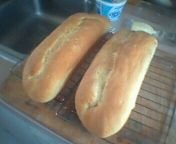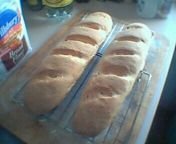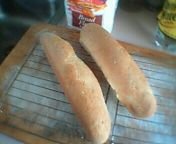I have been experimenting alot with new methods for bread baking that I have learned in my various books. I use all of these ideas routinely, as baking is a hobby for me, (time is no object) and I would like to get as close to perfection as possible. Certainly, I have had a great deal of success in the last year, and am very proud of some of the loaves I have been able to produce.
Nevertheless, I have to admit, that it is difficult to isolate which techniques result in the most improvement, and which have little effect at all. If I do ten things differently in a challah recipe, for example, while the finished loaf may be vastly superior to my previous attempts, it is almost impossible to say which changes truly made the difference, without going backward and making a determination using the process of elimination. (Which I hate to do, because it just feels wrong to go backward)
So I'm wondering, what has been everyone's experience with the following techniques and bread-baking issues.
Flour
When baking bread, I try to use a flour with at least 12% protein content, and for my most important loaves, I even go higher, with over 13%. What are peoples' impressions of the effect of protein content on bread? Keep in mind that I am well aware of what all the cookbooks and articles say about it. Has anyone done actual controlled tests in their kitchen to determine the precise effect?
Yeast
I started with active dry, then read that instant was better, but I did not notice any signficant difference between instant and AD. I am now using fresh compressed for all my bread baking. My fresh-yeast bread is VASTLY superior to anything I have made in the past. However, in all fairness, the fresh yeast recipes are much more complex than my old instant or AD ones, and I have been much more fastidious about technique since I started using it, so the fresh yeast may NOT be the real cause of the improvement.
Proofing
In the past, I followed the general time guidelines, and didn't pay much attention to how much the dough would rise. Now, I am very careful in only allowing the dough to double in volume, and when it is time for the final proof, I always carefully make sure that it only rises to about 1.5 volume, as recommended in my book. Does anyone know what effect this has? (Again, I know what the theory is, I'm interested in real-world application in a home kitchen) Also, has anyone noticed a significant difference in quality between bread that has only been proofed once before the final proof (as is standard in most recipes) versus bread proofed twice? (which seems to be common in the higher-end recipes)
Kneading
It is recommended that one knead the dough after each proof to redistribute the yeast cells, so they have a better chance to grow anew by seeking new food supplies. This certainly makes sense conceptually. But does anyone actually know what the substantive effect is?
Egg Wash
I am told that the best egg wash is a single egg, with approximately 1/8 tsp of salt, beaten, and then left in the refrigerator overnight prior to use. This certainly changes the color of the wash, but can anyone confirm a definite improvement in the color/quality of the loaf after baking?
Salt
I read somewhere that Kosher salt is superior to iodized salt. Thus, I have switched to Kosher. Kosher is coarser, so you do have to measure by weight to get an accurate conversion from recipes that call for iodized salt, but since I measure just about everything by weight now, versus volume, it really doesn't change anything time-wise. My question is, has anyone noticed a real difference in their baking? The cost to me of using Kosher versus table salt is negligible, so I don't mind, but I have to wonder how big a difference this could possibly make. Any experiences out there?
Baking Stone
These days I bake my bread on a baking stone, more because it is less trouble to leave it in the oven, and it does seem to eliminate hot spots. But I wonder if it really makes any difference other than that. Obviously it is very useful for pizza, but has anyone noticed a substantial change for, say, braided loaves?
Miscellaneous
What is the effect of substituting water for milk? This is both a theoretical, as well as practical question, as I have not read about this particular issue. Specifically, I have an outstanding challah recipe that uses milk, but I would like to have the option of making it non-dairy, for use with kosher friends and family. I could of course just expirement, but I'm a little wary of improvisation, and don't want to risk making a poor loaf. (It's one thing to fail while trying to be perfect, but it's another thing to just throw the ingredients away, knowing there's a good chance of failure)
Nevertheless, I have to admit, that it is difficult to isolate which techniques result in the most improvement, and which have little effect at all. If I do ten things differently in a challah recipe, for example, while the finished loaf may be vastly superior to my previous attempts, it is almost impossible to say which changes truly made the difference, without going backward and making a determination using the process of elimination. (Which I hate to do, because it just feels wrong to go backward)
So I'm wondering, what has been everyone's experience with the following techniques and bread-baking issues.
Flour
When baking bread, I try to use a flour with at least 12% protein content, and for my most important loaves, I even go higher, with over 13%. What are peoples' impressions of the effect of protein content on bread? Keep in mind that I am well aware of what all the cookbooks and articles say about it. Has anyone done actual controlled tests in their kitchen to determine the precise effect?
Yeast
I started with active dry, then read that instant was better, but I did not notice any signficant difference between instant and AD. I am now using fresh compressed for all my bread baking. My fresh-yeast bread is VASTLY superior to anything I have made in the past. However, in all fairness, the fresh yeast recipes are much more complex than my old instant or AD ones, and I have been much more fastidious about technique since I started using it, so the fresh yeast may NOT be the real cause of the improvement.
Proofing
In the past, I followed the general time guidelines, and didn't pay much attention to how much the dough would rise. Now, I am very careful in only allowing the dough to double in volume, and when it is time for the final proof, I always carefully make sure that it only rises to about 1.5 volume, as recommended in my book. Does anyone know what effect this has? (Again, I know what the theory is, I'm interested in real-world application in a home kitchen) Also, has anyone noticed a significant difference in quality between bread that has only been proofed once before the final proof (as is standard in most recipes) versus bread proofed twice? (which seems to be common in the higher-end recipes)
Kneading
It is recommended that one knead the dough after each proof to redistribute the yeast cells, so they have a better chance to grow anew by seeking new food supplies. This certainly makes sense conceptually. But does anyone actually know what the substantive effect is?
Egg Wash
I am told that the best egg wash is a single egg, with approximately 1/8 tsp of salt, beaten, and then left in the refrigerator overnight prior to use. This certainly changes the color of the wash, but can anyone confirm a definite improvement in the color/quality of the loaf after baking?
Salt
I read somewhere that Kosher salt is superior to iodized salt. Thus, I have switched to Kosher. Kosher is coarser, so you do have to measure by weight to get an accurate conversion from recipes that call for iodized salt, but since I measure just about everything by weight now, versus volume, it really doesn't change anything time-wise. My question is, has anyone noticed a real difference in their baking? The cost to me of using Kosher versus table salt is negligible, so I don't mind, but I have to wonder how big a difference this could possibly make. Any experiences out there?
Baking Stone
These days I bake my bread on a baking stone, more because it is less trouble to leave it in the oven, and it does seem to eliminate hot spots. But I wonder if it really makes any difference other than that. Obviously it is very useful for pizza, but has anyone noticed a substantial change for, say, braided loaves?
Miscellaneous
What is the effect of substituting water for milk? This is both a theoretical, as well as practical question, as I have not read about this particular issue. Specifically, I have an outstanding challah recipe that uses milk, but I would like to have the option of making it non-dairy, for use with kosher friends and family. I could of course just expirement, but I'm a little wary of improvisation, and don't want to risk making a poor loaf. (It's one thing to fail while trying to be perfect, but it's another thing to just throw the ingredients away, knowing there's a good chance of failure)



